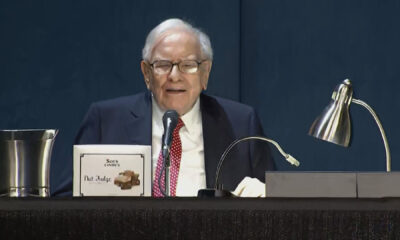Health
CMS says it will spend $3.5 billion on Leqembi, but this is unlikely

ABINGTON, PA – NOV 7: Nurse Christine Besso, center, helps Robert Williford, 66, left, during his … [+]
Skepticism may be warranted at the Centers for Medicare and Medicaid Services’ Office of the Actuary say Medicare could spend as much as $3.5 billion by 2025 on the Alzheimer’s disease drug Leqembi (lecanemab). Even CMS’ projected cost to Medicare of $550 million for Leqembi in 2024 appears to be off base.
CMS made several explicitly stated assumptions in its recent assessment of the cost of Leqembi’s Medicare coverage. Perhaps most striking was the assumption that a certain percentage of the eligible population of patients with early-stage Alzheimer’s disease would necessarily become actual users of the product, despite limited effectiveness and safety concerns surrounding brain bleeding and swelling.
To arrive at the estimates, CMS considered a number of public sources, including: paper in the Journal of the American Medical Association which estimated potential future Medicare expenditures and beneficiary costs for lecanemab based on an extrapolation of the number of patients with early Alzheimer’s disease from a 2018 Health and Retirement Survey.
Further public explanations from the manufacturers of Leqembi, Eisai and Biogen, suggested that as many as 100,000 patients would be “diagnosed as eligible” for treatment by 2026.
Judging from the number of diagnosed patients, CMS predicted 55,875 users by 2024. However, that does not reflect the reality of Leqembi’s relatively meager revenues to date. According to Endpoints news, total worldwide turnover of Leqembi were approximately $19 million in the first quarter of this year. Although the number of patients prescribed the drug is increasing – sales in the first quarter of 2024 have tripled compared to the fourth quarter of last year – by $19 million, it’s hard to imagine it quickly becoming the blockbuster that Medicare expect it to be. Fierce Pharma reported that by the end of January, only 2,000 patients were taking the drug nationwide, indicating that the sponsors would not meet the goal they had set of having 10,000 patients on the drug by the end of March.
CMS’s prediction assumes market penetration based on (percentages of) numbers of patients eligible for Leqembi. However, the fact that a certain number of patients are diagnosed with early-stage Alzheimer’s disease does not necessarily mean that a corresponding (projected) percentage of these individuals will be prescribed Leqembi or another monoclonal antibody like this that targets on the build-up of beta-amyloid plaques in the brain. . Plaque growth is believed to be a cause of Alzheimer’s disease.
It’s also important to note that the CMS estimates go well beyond what the drug’s sponsors, Eisai and Biogen, have predicted. article in STAT news detailed last month.
Undoubtedly, Alzheimer’s disease therapies and associated diagnostics could prove to be a budget buster for Medicare if these products gain significant traction. So far no one has done that.
Aduhelm Saga
It’s worth revisiting what CMS and others, including KFF, seemed to believe would happen when the first beta-amyloid-targeted monoclonal antibody indicated for Alzheimer’s disease, Aduhelm (aducanumab), arrives in 2021 was approved: namely a rapid adoption that would result in a significant budgetary implications for the Medicare program. This, in turn, would entail the need to increase Medicare Part B premiums. Part B includes physician-administered injectables, such as Aduhelm.
You can’t blame CMS or any other entity for thinking this way based on what researchers say. An article in JAMA has submitted that as 500,000 beneficiaries Aduhelm would be prescribed and Medicare pays 103% of the annual wholesale cost of Aduhelm. Total spending for Aduhelm in one year alone would be nearly $29 billion.
The assumption was that between 25% and 50% of the total eligible population would use the drug.
Prior to the publication of the nationwide coverage determination for beta-amyloid-targeted monoclonal antibodies in April 2022 and Aduhelm’s price drop to $28,000, CMS announced a 14.5% increase in the Medicare Part B premium.
Aduhelm experienced extremely poor acceptance in both the public and commercial markets. For example, in the fourth quarter of 2021, Aduhelm was only able to bring in $1 million in sales. Since then, the prospects for the biologic have not improved noticeably.
The drug’s manufacturer, Biogen, subsequently said it would “reprioritize resources allocated to Aduhelm to advance Leqembi and develop new treatment modalities.”
A muddled regulatory history, little proven efficacy, and significant safety risks doomed Aduhelm. And this meant that Medicare had grossly overestimated the product’s acceptance.
In 2022, Secretary of the Department of Health and Human Services Xavier Becerra announced that Medicare Part B premiums paid by Medicare beneficiaries would be adjusted downward to account for the overestimation of costs.
Why Leqembi’s absorption may be limited
Like Aduhelm, Leqembi is a biologic drug that reduces the buildup of plaque in the brain, which is believed to be a contributing factor in Alzheimer’s disease. Biogen and Eisai are co-sponsors of Leqembi, which accelerated and subsequently received full approval from the FDA in January and July 2023, respectively.
Phase 3 data for Leqembi showed a modest reduction in cognitive decline in patients with early Alzheimer’s disease. At the Clinical Trials on Alzheimer’s Disease Congress in December 2022, study investigators presented a full data analysis on the safety and efficacy of Leqembi. The findings published in the New England Journal of Medicine experts made optimistic and cautious at the same time, which was reflected in the medical journal article’s conclusion that the drug needed further study.
Leqembi offers some hope for patients with Alzheimer’s disease. It’s not Aduhelm redux. Accordingly, there has been a moderate increase in demand for the drug since its approval in July 2023. Nevertheless, the therapeutic is far from gathering the kind of momentum that would indicate imminent blockbuster status.
And while disappointing demand is a factor, MedPage Today reports that hospitals and health care systems have also taken longer than expected to set up their IV systems to deliver the drug to patients.
Eisai and Biogen plan to seek approval for a self-injectable version of Leqembi that would be easier for patients to use. This could lead to more customers. Further, blood tests instead of brain scans may ultimately speed up the detection of amyloid plaques.
Additionally, the FDA is reviewing another treatment that targets amyloid protein, Eli Lilly’s donanemab, which is expected to be approved later this year. Ultimately, this could strengthen demand for the therapeutic class of biologics as a whole.
However, doctors and patients still have questions about all of these medications, some related to safety issues while others question whether the treatments can clinically meaningfully reduce cognitive decline in patients. This has led to there are not a consensus among neurologists about whether they should recommend Leqembi to their patients.
Although studies have shown that Leqembi slows down cognitive impairment associated with Alzheimer’s disease, its benefits are considered modest, perhaps too small for some to see a benefit. There are also ongoing safety concerns.
All things considered, this is highly unlikely, even though Medicare expects to spend $3.5 billion on Leqembi next year.













